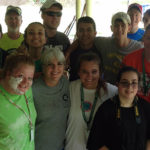FORT WORTH—When it comes to worship, too many Christians resemble neutrinos—subatomic particles that can pass through matter without being affected, a workshop leader told a Texas Baptist group.
“By definition, worship should mean transformation. It should mean change,” Jim Lemons, director of the master of arts in worship leadership degree program at Dallas Baptist University , told a workshop on transformational worship, offered in conjunction with the Baptist General Convention of Texas annual meeting.
Lemons decried neutrino-style worship—where worshippers can “pass through unchanged.”
Quoting Jeff Patton, author of God at the Crossroads, Lemons pointed to four components that cross to a “divine intersection” in worship—the lived world, the self, the void and the holy.
He identified the lived world as “the environment in which life is experienced—the good, the bad and the ugly.”
When Lemon spoke of the self, he stressed the importance of bringing all of human personhood—mind, body, emotions and spirit—into the worship experience.
The void can be “experiences that try to rob us of meaning and purpose,” he explained.
But worship also involves the holy—“God’s invasion of our lives,” he said. “When the holy shows up, God fills the void, makes the lived world meaningful and makes the self valuable.”
And in the process, Christians grow into the image of Christ, he added.
Sign up for our weekly edition and get all our headlines in your inbox on Thursdays
“People become like the thing that they worship,” he said.
Worship leaders cannot and should not manufacture transformative experiences, but they can create a climate in which they occur.
“What are we doing to set the stage for transformation in worship?” Lemon asked. He offered six principles to make worship transformational:
• Make God the target. While many church-growth experts focus on the importance of congregations targeting a niche audience of potential converts, Lemon stressed, “God is the audience.”
• Invoke the whole person. Rather than allowing people to be passive spectators in worship services, he encouraged worship planners to look for ways to engage worshippers mentally, emotionally and physically.
• Strive for worship that is sensory-encompassing. While much of the activity in worship is primarily auditory and secondarily visual, Lemon urged worship planners to seek ways to involve worshippers through taste, touch and smell.
He particularly stressed opportunities to make the Lord’s Supper a multisensory worship experience.
• Focus on prayer with consistency and variety. “Just 20- to 30-second prayers don’t cut it,” he said. He encouraged the use of small-group prayers and scheduled times of silence for personal silent prayer.
• Develop contexts for divine intersections. “Be invitational,” he urged. Keep in mind the life experiences of worshippers and their struggles to find meaning and purpose.
• Create a presence-based worship. “Keep the focus on God and the presence of the holy,” he said. “Our worship should be about seeking more of God. If we do that, people will come, and lives will be transformed.”














We seek to connect God’s story and God’s people around the world. To learn more about God’s story, click here.
Send comments and feedback to Eric Black, our editor. For comments to be published, please specify “letter to the editor.” Maximum length for publication is 300 words.